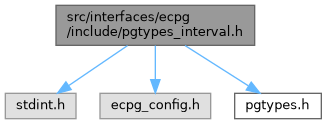

Go to the source code of this file.
Data Structures | |
| struct | interval |
Macros | |
| #define | HAVE_INT64_TIMESTAMP |
Typedefs | |
| typedef int64_t | int64 |
Functions | |
| interval * | PGTYPESinterval_new (void) |
| void | PGTYPESinterval_free (interval *intvl) |
| interval * | PGTYPESinterval_from_asc (char *str, char **endptr) |
| char * | PGTYPESinterval_to_asc (interval *span) |
| int | PGTYPESinterval_copy (interval *intvlsrc, interval *intvldest) |
Macro Definition Documentation
◆ HAVE_INT64_TIMESTAMP
| #define HAVE_INT64_TIMESTAMP |
Definition at line 15 of file pgtypes_interval.h.
Typedef Documentation
◆ int64
Definition at line 13 of file pgtypes_interval.h.
Function Documentation
◆ PGTYPESinterval_copy()
Definition at line 1082 of file interval.c.
References fb().
Referenced by ecpg_get_data(), and main().
◆ PGTYPESinterval_free()
Definition at line 997 of file interval.c.
Referenced by main().
◆ PGTYPESinterval_from_asc()
Definition at line 1003 of file interval.c.
References DecodeInterval(), DecodeISO8601Interval(), DTK_DELTA, fb(), free, MAXDATEFIELDS, MAXDATELEN, ParseDateTime(), pgtypes_alloc(), PGTYPES_INTVL_BAD_INTERVAL, str, tm, tm2interval(), pg_tm::tm_hour, pg_tm::tm_mday, pg_tm::tm_min, pg_tm::tm_mon, pg_tm::tm_sec, and pg_tm::tm_year.
Referenced by ecpg_get_data(), and main().
◆ PGTYPESinterval_new()
Definition at line 987 of file interval.c.
References pgtypes_alloc().
Referenced by main().
◆ PGTYPESinterval_to_asc()
Definition at line 1062 of file interval.c.
References buf, EncodeInterval(), fb(), interval2tm(), IntervalStyle, INTSTYLE_POSTGRES_VERBOSE, MAXDATELEN, PGTYPES_INTVL_BAD_INTERVAL, pgtypes_strdup(), and tm.
Referenced by ecpg_store_input(), intoasc(), and main().